Vitamin D and Diminished Ovarian Reserve (DOR)
- Dr. Jaime DeGuzman, DTCM, L.Ac

- Jan 18, 2023
- 2 min read
Updated: Jan 19, 2023
Multiple studies show that high dosages of vitamin D can improve ovarian reserve.

Vitamin D has been shown to support the immune system, reducing the likelihood of severe illness such as infections, heart attack, multiple sclerosis and cancer. It has also been shown that vitamin D can help promote bone health. Although lots of research has been done regarding the effects of vitamin D on ovarian reserve, the results are not conclusive. Below I try to break down one of the studies that seems to indicate that vitamin D could have an effect on AMH levels.
The study published in June 2021 by BMC Endocrine Disorders concluded that vitamin D supports a possible favorable effect on the increase of AMH expression.
“Our results have shown that there was a statistically significant difference in vitamin D levels of participants before and after the intervention. Moreover, there was a statistically significant difference in serum AMH levels of participants before and after the intervention.”
The aim of the study was to perform the first intervention studying the effect of vitamin D on ovarian reserve in an Iranian population.
The study
This Iranian study, performed between 2018 and 2019, took 51 women with low vitamin D levels (The Endocrine Society has determined vitamin D insufficiency as serum levels between 20 to 30 ng/mL, and vitamin D deficiency as levels under 20 ng/mL) and compared the before and after levels of AMH. After passing the inclusion criteria, the before levels of AMH and vitamin D were taken for all participants. For 3 months participants were administered 50,000 IU of vitamin D every week (about 7,000 IU daily). After 3 months, the levels of AMH and vitamin D were documented.
The study concludes by saying that there was a statistically significant difference in vitamin D levels of participants before [12.1(6.5)] and after [26(9.15)] the intervention (P < 0.001). There was also a statistically significant difference in serum AMH levels of participants before [0.50(0.44)] and after [0.79(0.15)] the intervention (P =0.02).
My interpretation
With a P value of 0.02 (a 2% chance that the result is due to just random chance) in the increase of AMH, I consider this a very strong correlation. I believe so strongly in this study, and many others, that in our acupuncture fertility clinic we put every patient with low ovarian reserve on a daily dosage of 6,000 IU of vitamin D.
While serum levels between 60 to 80ng/mL are considered normal, there is also evidence suggesting that higher levels can provide additional benefits such as preventing breast cancer and treat diseases like psoriasis, asthma, rheumatoid arthritis, and tuberculosis. There's currently no data to support any additional health benefit of having a level above 100 ng/mL. Vitamin D toxicity, which is frequently diagnosed when levels are over 200 ng/mL, can manifest as loss of appetite, feeling very thirsty, weight loss, constipation or diarrhea, abdominal pain, or musculoskeletal pain. These are all symptoms of hypercalcemia (too much calcium), remember vitamin D helps to absorb calcium.
In Conclusion
If your AMH level is low, get some blood work and have your vitamin D level checked. If you are below 60mL, consider taking a vitamin D supplement.






Comments